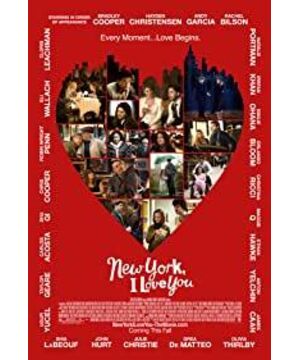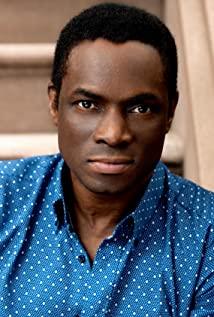"New York, I Love You" is the second installment in Emmanuel Bemby's "Love City" series by co-director producer Emmanuel Bemby. Like the previous "Paris, je t'aime" (Paris, je t'aime), the film consists of 12 separate short films. The 12 short films are mixed and edited, criss-crossing each other, showing the unique charm of New York as an international metropolis.
The first paragraph
director: Jiang Wen (Jiang Wen)
Plot: A little thief on the street, as usual, came along with the wallets of passersby in a hurry. The thief who had emptied his wallet found the beautiful woman who was taking pictures, and followed him to the bar to chat up, starting with his mobile phone as usual. At this time, an uninvited guest came and disrupted the thief's position. This is the man whose wallet was stolen by the thief just now. The woman turned out to be the man's extramarital lover. The thief's stealing skills were seen by the man, but he had no choice but to confess that he was a thief, and finally left in embarrassment. But this woman unexpectedly fell in love with the thief.
Analysis: Jiang Wen's works have always stood on both ends of the comments. Those who like him feel that his talent is impeccable, while those who don't like him feel that the stories he tells are unintelligible and full of subjective color. It is true that Jiang Wen's film subjectivity is particularly strong and extreme, but this subjectivity is deliberately blurred by the director in the film. Most of them emphasize the director's own understanding of human nature and the beauty of human nature, which is also Jiang Wen's way of expressing himself. .
Although this story is very simple, it has a very rich meaning. The men and thieves in the film are representatives of charismatic men of different ages with Jiang Wen's characteristics. The old thief is mature and sophisticated, making it impossible for people to guess and control, but the rich talent and knowledge can't help but admire. On the other hand, the thief is young and handsome, respects women, and knows timely humor and candor.
The women in the film play a role as a chooser, and here they favor most of the very weak thieves. This transition comes suddenly at the end. It's also the tone of most of the entire movie - full of twists and contrasts from the O'Henry-esque ending. But this kind of contrast emphasizes suddenness, is a decision-making contrast dominated by desire and human nature, and is irrational. This is also what the film wants to show, New York's respect for human nature, and the sense of balance and harmony between human nature's natural desires and life.
It is worth mentioning that there are many Chinese elements in the film, such as swearing in Mandarin and the music of Cui Jian's "Flower Girl". .
The second paragraph
Director: Mira Nair (Mira Nair)
Plot: The Hadrian women and Jain men show different understandings of religion, love, belief and life philosophy when they trade diamonds, and the differences between the sexes There seems to be no affection. A Hadid woman is not allowed to touch a man before the wedding, but she has a very close feeling for the man in front of her. Later, at the woman's wedding, she sees her husband as the man in the diamond row. She would suddenly laugh happily. The man is also driving on the highway, smiling and looking at the photo of himself and his wife.
Analysis: The film tells the story of the friction between different worldviews and the search for common ground among people of other faiths living in New York.
There are many people who see the love factor in this film: they say that the two of them are attracted to each other and have a short-lived feeling of love. In fact, the emotional connection between two people is not so simple, but through the connection of the man's wife who has become a monk, the two people are connected. The man seemed to see his own woman and his own beliefs when the Hadrian women took off their wigs. The previous beliefs were weakened, and he felt that the gully-like doctrinal differences were no longer so obvious. At this moment, he only felt love. This love comes from the primitive human impulse to believe. And the woman also felt the love. Like the man, she slightly felt some inexplicable things given to her by the wife of the man who had become a monk of unknown meaning. Therefore, they seem to have awakened to something at this moment, and they are no longer the same as before.
She looked at her husband as if she saw the man before. She smiled happily because she expected that her husband would love his wife quietly like that man.
Their lives stretched out so peacefully and silently.
This story is actually a bit obscure, but it can actually be told a little more plainly. After all, many things are associated with religion, and it is easy to cause ambiguity. However, Natalie Portman's bald head image is very beautiful, which makes people feel at ease and healed.
Section 3
Director: Shunji Iwai
Plot: A story about a sloppy scorer at home who constantly complains on the phone to the director's female assistant in the face of the director's impossible task of reading Dostoevsky's famous novels. The weak understanding and affection between the two also slowly grew. When the composer couldn't bear the director's unreasonable demands, the two parallel lines finally intersected. The female assistant borrowed the story of Dostoevsky and his wife and came to the life of the composer.
Analysis: The subtlety of Japanese directors is also shown in this short film. The most obvious is that kind of beautiful love. It's hard to show through a simple plot narrative.
Iwai said in the interview: "That tall and handsome sound engineer is actually an otaku. He doesn't have any friends in life. He just stays in his small room and does his own work every day. In Japan, there are many such people. However, they basically have no source of life. They are bored at home all day long, doing nothing, watching comics and cartoons to pass the time. I put this Japanese story in New York because I think that there may be such young people in New York. People."
This story shows the implicit eastern style of love, but it has a western twist. A man's love for a woman is invisible, invisible, and only a slight existence of indescribable emotions. He doesn't even know what this woman looks like, but he has a good impression of her, perhaps because she can always listen to his complaints sincerely. But he didn't really do anything for his feelings. When two people may never meet again. Women appear as the role of actively changing the status quo, reserved and active into the life of men. This emphasizes a love that combines the charms of both the East and the West.
The story is unexpected and charming because of a beautiful story in a movie.
Director of the fourth paragraph
: Yvan Attal
Plot: A man meets a woman on the street. He tries his best to tease him with words and confesses that he is a writer, but the woman backs down step by step. When his true identity was revealed, the male writer was dumbfounded and speechless.
Analysis: A story of a man who is expected to pursue his passion flirting with a woman who borrows fire on the street. The lines are very deft and explicit. The turning point of the story itself is also very good, and the performances of the two complement each other and are full of interest. Showing the first step in an open New York environment, this short film has paved the way for many of the following short films, mainly responsible for substituting the audience into the open urban environment of New York, and for the subsequent erotic stories. The director also directed another story of street flirting behind, which has another interest.
The fifth paragraph
Director: Brett Ratner (Brett Ratner)
Plot: A lovelorn little boy accidentally won the favor of the drugstore owner, allowing him to take his beautiful daughter to the dance. The boy was disappointed to see the pharmacy owner's daughter in a wheelchair that day. The story that followed was as expected, encountering an ex-girlfriend, an embarrassing dance party, the car being snatched away, and everything went very badly. The wheelchair girl gave the boy a special night to thank him for taking him to the dance. Afterwards, the boy unexpectedly discovered that the wheelchair woman was just an actor, and that sitting in a wheelchair was just an experience of life.
Analysis: This paragraph is actually very interesting. The plot is indeed as vulgar as many youth films, but due to the contrast of the actors and the overall environment, it does not seem out of place, but it has the feeling of a small dessert in the meal. Since the film does not deliberately pursue unity, it is acceptable for such a story to occur. On the contrary, there is a sense of Hollywood-style joy, and the audience immediately feels the breath of American movies. The film shows people of all ages with different beliefs and lifestyles, and it can be seen from this that there is no emphasis on one aspect.
The ending story of the little thief and the young girl is also put behind this, which is a summary of the love of the young people.
The sixth paragraph
Director: Allen Hughes (Allen Hughes)
Plot: After a man and a woman have experienced love that doesn't know how to happen, they can't forget each other and reject the chaos, but they can't help but go back to the bar they met before. , The two were reserved and excited to hug and kiss in the taxi, as if it should happen. Because it seems that on that night, not only the physical communication, but also the feelings infiltrated unknowingly. Maybe they've only just discovered it themselves.
Analysis: It was originally a very difficult subject to control, but the director's control is still very good. Both of them are reflecting on the matter itself, but they are also thinking about why they are attracted to each other. In the end, I chose to stay true to my heart, and let myself go with that inexplicable attraction.
The story of a female photographer meeting a male writer happened later, which enriched the character of the male writer and made the audience see that he is also a lovely person who is kind and understands life. The previous flirting story began to take on a new color. The film did not simply express lust itself, but wanted to show the state of conflict and reconciliation between lust, life and human nature, which is also the state of New Yorkers. Respect yourself and try to understand yourself.
The seventh paragraph
Director: Shekhar Kapur (Shekhar Kapur)
Plot: The old famous female singer came to a hotel in New York and met two waiters. Old waiter, professional and gentleman, but not particularly comfortable. Young waiter, physically disabled, but very kind, with pure eyes, sincere and sincere in dealings with others, full of emotion. The young waiter had not known the singer's name before, nor had he heard her singing. But having brought her violets would have flattered the singer; and the old waiter's statement that they had been carefully prepared for her did not arouse any particular joy in her. The young waiter stumbled and fell downstairs, as if he had never been there. It all seemed to be just a dream of hers.
Analysis:
The young waiter seems to be the waitress that the female singer hopes, maybe he never existed, which represents her pursuit of some kind of hope. Maybe she wanted to die, or the waiter was originally a part of herself, incomplete but pure, maybe she was afraid of some kind of inexplicable fear of unknown life, old age and no fame.
Or she just wants to get in touch with the feelings of some real and beautiful people. Maybe the people she has dealt with in her life are excellent and self-disciplined, but what she really expects may only be given to her by those who are like gold in their hearts.
In fact, the director did not want to tell the story very clearly. Since the script was written by the famous artist Anthony Minghella, he died suddenly shortly before the filming started. No one really knows the meaning of movies anymore. But the elegance and classical temperament shown in the film will make people feel like a holy baptism. Like a very beautiful painting, although the viewer does not know the subject of the painting, it will still be moved.
The eighth paragraph
Director: Natalie Portman (Natalie Portman)
Plot: A black man plays with a little white girl in the park, and is praised by a passing woman as a very dedicated male nanny. When the girl's mother picked her up, the man showed very complicated feelings. The dancer's man greeted the audience by dancing on the stage, while the little girl cried out to her father and looked at him cheerfully as if she were observing the city.
Analysis: This clip is one of the rare stories that does not directly describe love, but mainly focuses on describing the family relationship between father and daughter. But this kind of affection is not the kind of father-daughter in a normal family. His father and mother divorced, and he was raised by his mother and stepfather. But the father tried his best to give the child a warm feeling and did not want her to be hurt again.
The father in the daughter's eyes is like a dancing city, a fairy tale and realistic support.
Every city has its own sad past or cause. To face this past calmly, to be full of hope for the future, and to cherish the little happiness that we still hold in our hands, is the answer given by New York.
The ninth paragraph
Director: Fatih Akin
Plot: The painter listened to a driver's nagging in a taxi that he was also a painter himself. To say that this city is full of all kinds of freshness and possibilities. Later, the white-haired painter met the Chinese girl in the pharmacy, and was moved by her temperament and appearance, and could not extricate herself to paint her. However, he smoked and drank heavily, and his life was irregular, and he often fainted suddenly without knowing it. He finally had the courage to talk to the girl again in advance, hoping that she could be his model. But the girl was timid and did not dare to face it. But at the same time she mustered up the courage to go to the painter only to find that the painter was dead. Only the unfinished line drafts are left.
Analysis: In the vegetable market, the painter: "I hope to paint you, just paint a portrait." Girl: "Why choose me?" Think about it." The
painter hopes for some beauty that can move his original emotions, while the girl hopes for some non-trivial things in life. Both hoped for a miracle to happen, and it did happen. The two people only said less than 10 dialogues, but the ties between them have gone deep into their hearts.
The story is about the differences between populations and the seemingly futile efforts of individuals to push those boundaries. In the end, the girl picked up the paper on which she was drawn on the napkin, and in the same restaurant, she pasted the eyes of her photo on it, and completed the work shared by the two of them. The sadness of the past can also be regarded as a place to fall. Those feelings of disassociation also seem to have found an outlet.
Section 10
Director: Yvan Attal
Plot: A middle-aged man walks out of a restaurant to light a cigarette on the side of the road, when he encounters a woman with provocative words. Disappointed by her middle-aged married life, women hope that men can give her some other novelty. There seemed to be a further possibility between the two, but the woman floated away again like the wind.
In the restaurant, men and women sat at the same table, smiling at each other, feeling the feeling of being a stranger just now, and slowly coming out of the predicament of their marriage.
Analysis: The seven-year itch seems to be saying something like this. The husband no longer has the passion for his wife at the time, and the desire for new and exciting things also arises in his heart. Marriage is in trouble, a problem that every couple in the world may encounter.
Director Ivan Adal's second short film shows people another possibility. When couples flirt like strangers on the street, those long-lost feelings seem to return to the hearts of lovers. The director's first short film is a fiery conversation between irresponsible strangers, and the theme is similar, but it has found a suitable foothold for the New York-style passion. Passion and desire have always been what humans seek, how to balance this feeling with life itself. It's an issue that everyone cares about. The night in New York is full of opportunities and temptations, attracting people to step into it. However, New York is practical. When the day comes, everyone is also making choices for their own lives.
The eleventh paragraph
Director: Joshua Marston (Joshua Marston)
Plot: Two old couples bicker and quarrel in the street, walking slowly on the way to the beach. The waves crashed against the sands of the coast, and the seagulls soared, and the two elderly people spent their 63rd wedding anniversary in this way.
Analysis: Love is not always as beautiful as it used to be, youthful youth and passion in middle age have turned into chatter and complaints under the agitation of marriage and life. But after being able to spend more than 60 years together, the precipitation of that time is hard to break no matter what.
When a woman is old, in addition to wishing for a smooth life for her children, she can only think of her husband to live longer. Even if he criticizes him for his bad every day, he still regards him as his own support in his heart. When a man is old, he can't walk fast with a cane, and his shoulders are no longer as strong as when he was young, but he still holds a woman in his arms and kisses her forehead tenderly.
It's an invisible promise, even if it's not written down, that every couple in love will read. Marriage or love doesn't seem to be that important. Even if we quarrel and quarrel every day, it is enough to be able to walk hand in hand and support each other on the final road of life.
Section 12
Director: Randy Balsmeyer
Plot: I don't know how many plots this director has directed: a story about a middle-aged man teasing each other with a prostitute in a dry cleaner. There are young couples quarreling about travel, sweet and interesting. It's about women with cameras shooting everywhere. She took a taxi, met a writer in a cafe, met a prostitute who was approached, and met a Chinese girl, all of which were her stories and images, and she projected everything she filmed on the top floor of the building.
ps: There are also some missing images, I don’t know who they belong to: the two people at the beginning of the film are riding in a taxi, one is a man in a quarreling young couple, and the other is a man who has a one-night stand with a woman. And a conversation between a drugstore owner and a woman on a one-night stand about buying medicine. There is also a small clip of the artist in the taxi at the beginning of the film and talking to the previously hot-tempered taxi driver. I personally thought that these were all for the sake of a series, so let's put them here and analyze them together.
Analysis: This is the most inadvertent but the most important paragraph in my opinion. This story was scattered and placed in various corners of the film. The woman holding the camera met many characters in the film, met them inadvertently, and had some conversations.
At the end of the film, all the stories are linked together, showing the small aspect of the big city of New York, and everyone seems to be connected. Perhaps it is also another expression of the six-dimensional space theory, or an expression of urban compact living.
The whole movie's short stories are edited and mixed together. Because the directors who shoot these short films are required to abide by the following three rules: one, the shooting is completed in 24 hours; two, the production is completed in one week; three, there must be correlation between each clip. And the entire filming cycle took only 36 days, so it felt a little messy in the film. However, this sense of clutter gives the film an indescribable coherence in the clutter due to the interweaving of the stories and the occasional interlude of the protagonist. Just like in a city, we see a stranger and look at his face, so unfamiliar, but as if we have seen it before.
Maybe this is the urban impression the whole series is trying to express. Fragmented, with a faint sense of unity.
View more about New York, I Love You reviews











